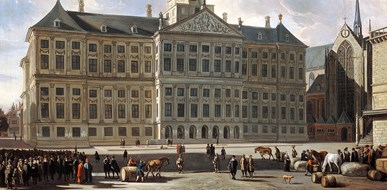[Call for Papers] Law and governance of a global city: 17th-century Amsterdam
Published 7 July 2019
Atelier van Gerrit Berckheyde - Amsterdam Museum, Publiek domein
Four hundred years ago, like today, globalisation and urbanisation impacted the world’s cities. In seventeenth-century Amsterdam, the afflux of trade and migrants prompted rapid economic and demographic growth, resulting in dynamic multicultural urban life and leading to complex questions of governance.
In relation to this topic, a new call for papers invites submissions engaging with questions and issues related to the city and its role in trade and commerce, immigration and diversity, and innovative governance and law. Selected submissions will participate in a symposium that will take place in Amsterdam in June 2020.
Amsterdam as a global city
The foreign merchants and newcomers were governed by the city administrators, who pursued policies of commercial and religious freedom. The governance of the city was both local and global. The Amsterdam Chamber of the Dutch East India Company was the most affluent and had a large say in the Company’s policies.
From 1500 to 1700 Amsterdam grew from 12.000 to 200.000 inhabitants, mostly due to massive immigration. The communities of foreign merchants and often well-skilled newcomers were very well connected to their home regions and cities contributing to the constitution of Amsterdam at the center of global trade networks.
It was the city where the first ‘modern’ stock exchange was established and the availability of capital pushed the Amsterdam and Dutch economy into a new phase of capitalism. The Dutch hegemony in the global slave trade soon made a significant contribution to the wealth of the city.
The city’s relatively tolerant intellectual climate contributed to an influx of – sometimes very wealthy – religious refugees as well as progressive/radical thinkers.
Legal and institutional responses to governance challenges
Economics and politics, as well as the private and the public, were highly intertwined in Amsterdam. Inevitably, this meant asking how to govern such a rapidly expanding and very diverse city well?
Amsterdam – the rising metropolis of a rapidly expanding colonial Empire - was a city in need of new ideas, policies, and institutions to govern at home and abroad. The global role of cities and city-based companies contributed to a normative discourse, which drew on different bodies of law, including (Dutch-)Roman law and the emerging law of nations and nature, ius gentium et naturale. Slavery, trade, war, as well as discussions of religious toleration, justice, and good government triggered legal questions and debates.
Call for papers
Against this background, this Call for Papers invites submissions engaging with the aforementioned questions and issues related to three themes:
- City of commerce and trade
- City of immigration and diversity
- City of Innovative governance and law
We call on scholars from legal history, history and theory of international law, urban history, as well as scholars from related disciplines, such as political philosophy, economic history, social history, history of ideas and intellectual history, history of slavery and empire, and migration studies, to send an abstract of circa 500-700 words setting out the prospective paper they would like to submit for inclusion in the symposium dealing with one of the themes identified within the overarching topic of law and governance of Amsterdam in the 17th-century.
Please submit paper proposals to LGAmsterdam@asser.nl
Deadline Abstracts September 1, 2019
Click here for the full call of papers.
Read more about our Global City project here.




